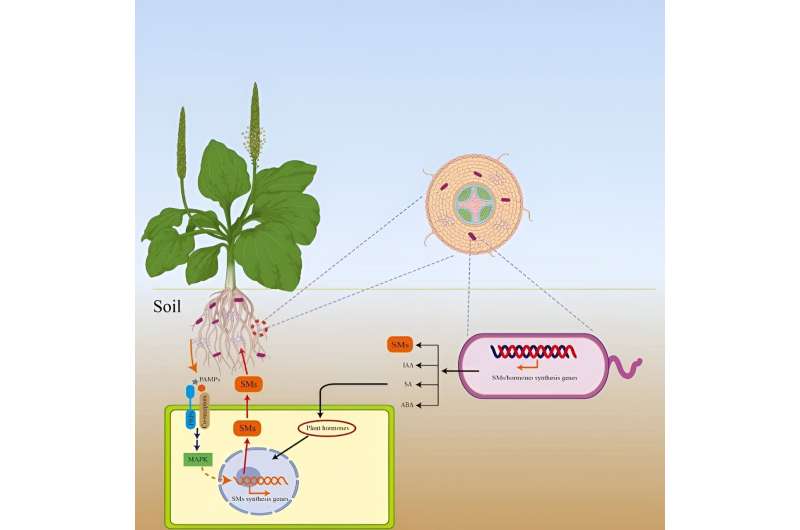Microorganisms can regulate the accumulation of secondary metabolism in medicinal plants through various strategies. Credit: Medicinal Plant Biology (2024). DOI: 10.48130/mpb-0024-0011
Medicinal plants are important economic crops and of great value in the health care industry. The rapid growth of market demand has led to a shortage of Chinese medicinal crops and an annual increase in prices. Secondary metabolites (SMs), as the main active components in medicinal plants, are widely used to produce clinical therapeutic drugs or raw materials for drug preparations.
The accumulation of SMs in medicinal plants is influenced by both internal physiological factors and external environmental factors, such as climate, soil physicochemical properties and microorganisms.
In recent years, studies have found that the rhizosphere and endophytic microorganisms play a vital role in the accumulation of key SMs in many medicinal plants.
Recently, Professor Hong Wu and his team from the Medicinal Plant Research Center of South China Agricultural University published a review paper titled "Regulation of Secondary Metabolites Accumulation in Medicinal Plants by Rhizospheric and Endophytic Microorganisms" in Medicinal Plant Biology.
In this review, they summarize the factors that affect the composition of rhizospheric and endophytic microorganisms in medicinal plants, including the physical and chemical properties of the soil, planting mode, different developmental stages of medicinal plants, and plant cultivars.
In addition, the review shows that microorganisms encode genes related to nitrogen fixation, phosphate metabolism, hormone synthesis, and root colonization. By fixing nitrogen and dissolving phosphate rock to release free phosphorus, plant height and fresh weight of medicinal materials can be increased. Moreover, some microorganisms can promote the growth of medicinal plants by inhibiting the growth of pathogens.
The review also discusses the mechanism by which microorganisms promote the accumulation of SMs in medicinal plants. Some microorganisms synthesize SMs through gene clusters encoding SM synthesis related genes. Moreover, microorganisms can synthesize plant hormones or affect the accumulation of SMs by influencing the hormone levels in the host.
Furthermore, microorganisms can increase the content of active substances by activating the immune system of medicinal plants, thereby stimulating the expression of genes related to metabolic pathways. Conversely, SMs synthesized by some medicinal plants can also affect the composition of the microbial community.
This review on endophytic and rhizospheric microorganisms regulating the accumulation of active ingredients in medicinal plants can lay a theoretical foundation for the development of efficient and high-quality microbial fertilizers, thus contributing significantly to the advancement of green agriculture.
More information: Jianbin Yu et al, Regulation of secondary metabolites accumulation in medicinal plants by rhizospheric and endophytic microorganisms, Medicinal Plant Biology (2024). DOI: 10.48130/mpb-0024-0011
Provided by Chinese Academy of Sciences
























